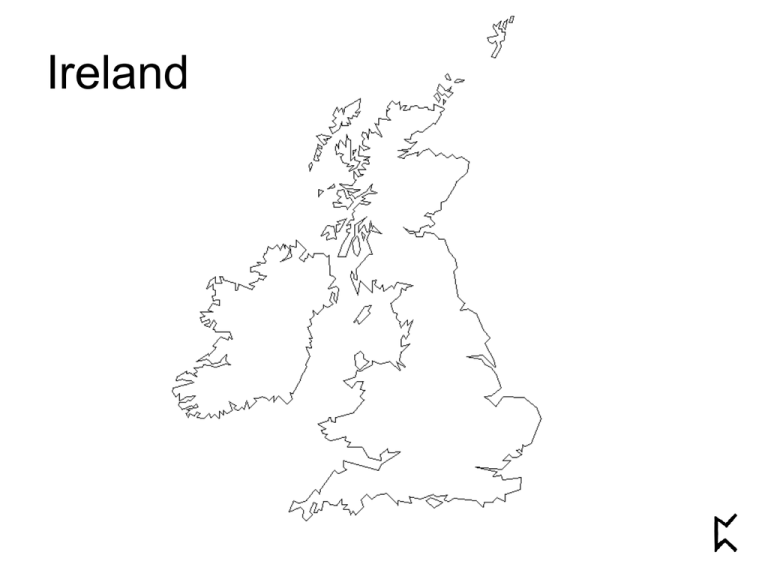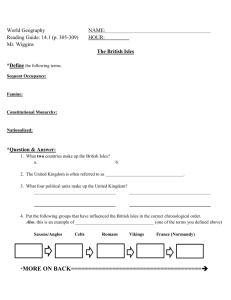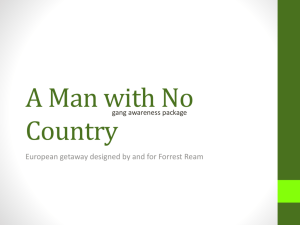Slide on Ireland
advertisement

Ireland Ireland Iceland and Ireland on the same scale 103,000 km² 317.000 3 /km 84,412 km² N.I. 1.8 m R.I. 4.5 m 73 /km Ireland • North and South. – Northern Ireland, still a part of the UK – The Republic of Ireland, Eire, independent since 1921 Provinces and Counties http://www.spirited-ireland.net/map/_counties/ http://www.wesleyjohnston.com/users/ireland/geography/settlement.html Ireland • North and South. – “Northern Ireland” or Ulster, still a part of the UK – Ireland or Eire, independent since 1921 • Two different origins of English in the North and the South,both dating from the 17th century. – South: Anglo-Irish (mostly from Western England) – North: displaced Scots Ireland • For the early period, 17th-18th cent the English of the North and South were cut off by a band of Irish across the middle of the country. • Both fully rhotic: – alveolar or retroflex approx (not the Scottish roll ) – General lack of dark l (unlike Scottish) Northern Ireland • Consonants: – þ and ð occur (not as in South) – So no t-þ and d-ð merging – Fully rhotic, not rolled – Lack of dark l Northern Ireland • Vowels – Vowel system closer to Scottish English. – GOOSE and FOOT merged – TRAP and PALM merged (no TRAP-BATH split) – LOT and THOUGHT merged Northern Ireland • Vowels – Loss of phonemic vowel-length distinction: Aitken's Law rather than Lax/Tense and clipping – Recap Aitken's Law : except - always short Northern Ireland • Vowels – Aitken's Law in N.Ireland is slightly different: except - always short Northern Ireland • Vowels Northern Ireland • Vowels Northern Ireland • Vowels Northern Ireland • Vowels Southern Ireland – the Irish Republic • Norse spoken in and around medieval Dublin • English spoken in Ireland (The Pale) since around 1200 – settlers from Bristol • Present-day English is from the ‘planters’ of the 17th century – predominantly from SW England • Very conservative: very few traces of later British innovations Southern Ireland – the Irish Republic • The 'brogue' • (barróg 'accent, speech impediment, or bróg =shoe (from Norse brók) • Very conservative: very few traces of later British innovations – No FLEECE Merging – No BATH Broadening – No H Dropping – No Glide Cluster Reduction – No Move towards R Dropping (unlike England) Southern Ireland – the Irish Republic • Irish substratum: – vowel system basically Irish (Wells 410) – some substratum effects in the consonants too, but English consonants such as and z, which do not occur in Irish, have been added – Syntactic substratum: Sure I’m after tellin you It’s thinking I am you’ll be hungry Southern Ireland – the Irish Republic Vowels • Unrounding of • LOOK-STRUT Split, uncertain in places, but not with the same lexical incidents is a back unrounded centralised TRAP is [a] any, many with TRAP, = Annie, manny. No Long Mid Diphthonging: FACE, GOAT fe:s go:t KIT-Schwa MErger (Lenin-Lennon) Southern Ireland – the Irish Republic Consonants • Þ and ð become dental stops t and d (this is heard by other British speakers as t and d, but outside Dublin there is a distinction between thin and tin, breathe and breed. • Lenition of medial (=between vowels) and final consonants, esp /t/, to [t ] or even[h] nah01tAl 1sah0rde (graphic follows) Southern Ireland – the Irish Republic • • • • Southern Ireland – the Irish Republic Rhotic: r is dark, even retroflex l is light in all environments No H Dropping Scwa epenthesis: Dublin, petrol, Cathleen, film, form, tavern. • Broad and narrow consonants Southern Ireland – the Irish Republic







